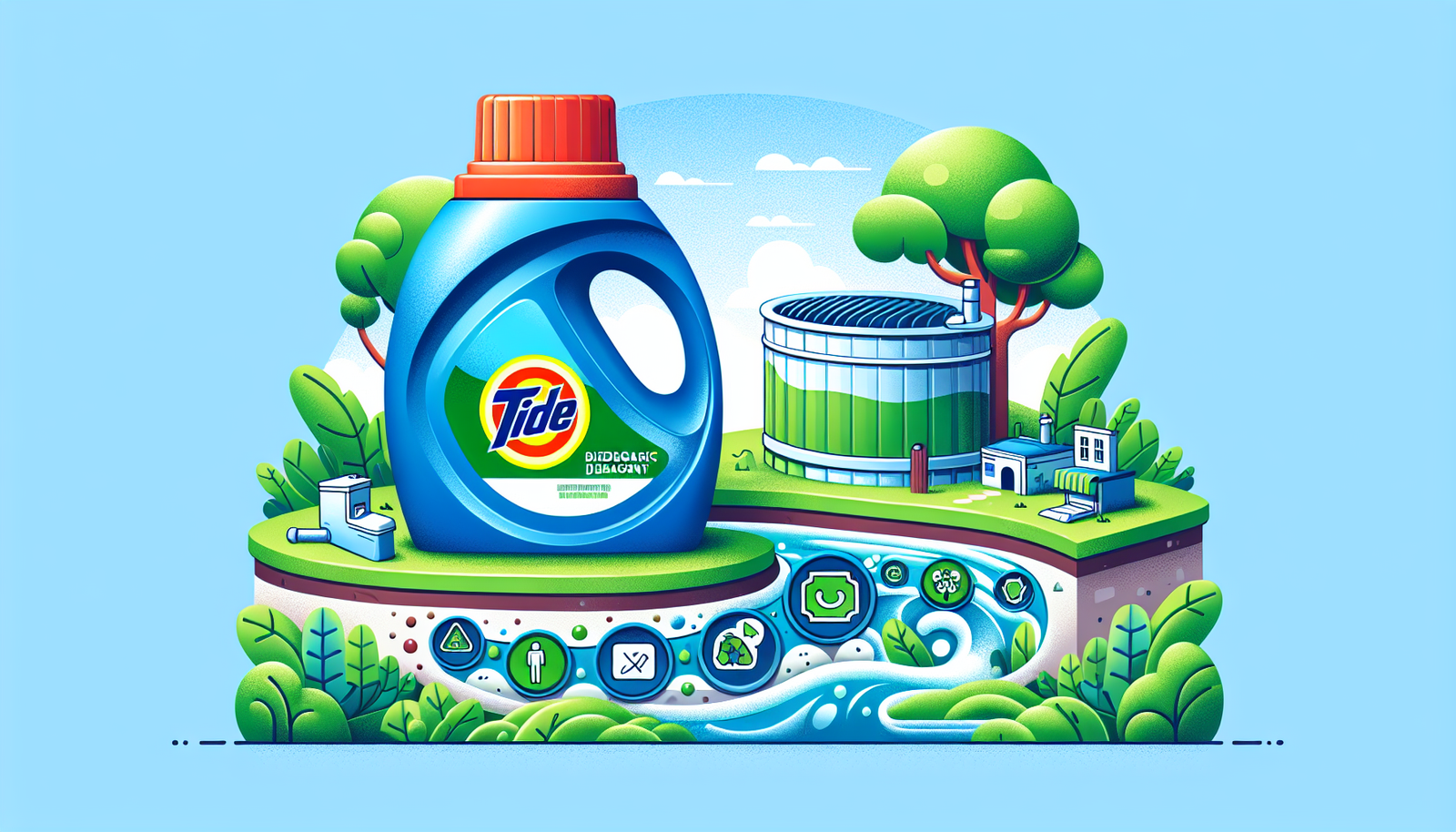
Have you ever wondered if your laundry detergent is safe for septic systems? In this article, we will explore the question of whether or not Tide laundry detergent is compatible with septic systems. Many households rely on septic systems for waste management, so it is essential to ensure that the products we use do not harm this crucial infrastructure. By understanding the potential effects of Tide laundry detergent on septic systems, you can make informed choices and maintain the health and functionality of your septic system.
Overview of septic systems
Septic systems are an essential component of homes that are not connected to a municipal sewer system. These self-contained wastewater treatment systems are commonly used in rural areas and rely on natural processes to treat and dispose of household sewage. Understanding how septic systems work and the importance of proper maintenance is crucial for ensuring their longevity and functionality.
Definition of septic systems
Septic systems are underground wastewater treatment systems that consist of a septic tank and a drainfield. The septic tank acts as a repository for incoming sewage from the household, where solids are separated from the liquid. The liquid portion, known as effluent, then flows into the drainfield, where it is further treated and safely released into the soil.
How septic systems work
Septic systems operate through a combination of natural processes and mechanical components. The septic tank facilitates the separation of solids from the liquid, allowing bacterial action to break down and decompose the organic materials. This process produces gases and sludge, which are contained within the tank. The treated liquid effluent is then distributed into the drainfield, where it undergoes further treatment through soil absorption and filtration.
Importance of proper maintenance
Proper maintenance of septic systems is vital for their efficient and effective operation. Regular inspections, pumping of the septic tank, and responsible usage habits help maintain a healthy balance within the system. Neglecting maintenance can lead to issues such as clogging, leakage, groundwater contamination, and even septic system failure. By following recommended guidelines and implementing preventive measures, homeowners can ensure the longevity and optimal functioning of their septic systems.
Understanding laundry detergents
Laundry detergents play a crucial role in cleanliness and hygiene by effectively removing dirt, stains, and bad odors from our clothing. However, it is important to understand the composition and potential impacts of laundry detergents on septic systems to make informed decisions about their usage.
Role of laundry detergents
Laundry detergents are specifically formulated to remove dirt, grease, and stains from clothes during the washing process. They contain various active ingredients that enable the effective breakdown and removal of contaminants, ensuring clean and fresh-smelling clothing after each wash. However, the ingredients in laundry detergents can have varying effects on septic systems, making it crucial to choose the right detergent for households with septic systems.
Composition of laundry detergents
Laundry detergents are composed of a combination of surfactants, builders, enzymes, fragrances, and other additives. Surfactants help to remove dirt and stains by reducing the surface tension of water, allowing it to penetrate fabric fibers. Builders assist in water softening and enhancing the detergent’s cleaning power. Enzymes target specific stains and help break them down. Fragrances are added to impart a pleasant smell to freshly washed clothes, and other additives may include brighteners, anti-static agents, and fabric softeners.
Different types of laundry detergents
There are various types of laundry detergents available in the market, including powders, liquids, and pods. Each type has its own advantages and characteristics, but the impact on septic systems can depend on the specific formulation and ingredients used. It is essential to consider the compatibility of laundry detergents with septic systems to ensure optimal performance and minimal negative impact.

Potential issues with septic systems
While septic systems are designed to efficiently treat and dispose of household wastewater, certain factors can pose potential challenges and lead to system issues. Understanding these issues and their impacts can help septic system users make informed decisions to mitigate risks.
Impact of harmful chemicals
The use of household cleaning products, including laundry detergents, containing harmful chemicals can have detrimental effects on septic systems. Harsh chemicals, such as bleach, antibacterial agents, and phosphates, can disrupt the natural balance of bacteria within the septic tank, hampering its ability to break down solids effectively. Additionally, strong chemicals can also kill beneficial bacteria in the drainfield, leading to decreased filtration and absorption capacity.
Disruption of natural balance
Septic systems rely on a delicate balance of microorganisms to effectively treat wastewater. Any disturbance to this natural balance can result in functional issues. Harsh chemicals, excessive water usage, and improper waste disposal practices can disrupt the microbial ecosystem within the septic tank, leading to reduced treatment efficiency and increased accumulation of solids. Regular maintenance and responsible usage habits are essential to maintain the natural balance and prevent system malfunction.
Consequences of septic system failure
Neglecting the maintenance and proper usage of septic systems can lead to costly and potentially hazardous consequences. When a septic system fails, sewage backups, foul odors, and groundwater contamination can occur. These issues not only pose health risks to residents but also require significant repairs or even complete system replacement. By understanding the potential issues and taking proactive measures, such as using septic-safe laundry detergents, homeowners can avoid these unpleasant situations.
Ingredients in Tide laundry detergent
Tide laundry detergent is a popular and widely used brand with a range of products catering to different laundry needs. Understanding the ingredients in Tide laundry detergent can help septic system users make informed choices and assess its compatibility with their systems.
Active cleaning agents
Tide laundry detergent contains powerful surfactants and enzymes that effectively remove stains and dirt from fabrics. These active cleaning agents are carefully formulated to break down a wide range of contaminants, ensuring clean and fresh garments. While these agents contribute to the detergent’s cleaning efficacy, their impact on septic systems may vary depending on the specific formulation and concentration.
Preservatives
Preservatives are added to laundry detergents to maintain their shelf life and prevent microbial growth. These compounds inhibit the growth of bacteria and fungi in the detergent, ensuring its effectiveness until use. While preservatives are necessary for product stability and safety, their potential impact on septic systems depends on the specific preservative used and the concentration present.
Fragrance
Fragrances are added to laundry detergents to provide a pleasant scent to freshly washed clothes. Tide offers a wide range of fragrance options to suit individual preferences. While fragrance itself does not directly impact septic systems, it is essential to consider any additional ingredients used in the fragrance formulation that may affect the microbial balance within the septic tank or the drainfield.
Other additives
Tide laundry detergent may also contain other additives, such as brighteners, fabric softeners, and anti-static agents. These additives enhance the cleaning experience and improve the appearance and feel of clothes. However, when considering their compatibility with septic systems, it is important to assess the specific ingredients and their potential impacts on microbial activity and system functionality.

Septic system safe laundry detergents
Choosing septic system safe laundry detergents is crucial for maintaining the health and functionality of septic systems. Several types of detergents are considered septic-safe, taking into account their formulation and potential impacts on the microbial balance and overall performance of the system.
Phosphate-free detergents
Phosphates, commonly found in many laundry detergents, can contribute to excessive algae growth in lakes, rivers, and other bodies of water when released through wastewater. Phosphate-free detergents are formulated without the use of phosphates, making them a safer choice for septic system users. These detergents effectively clean clothes without adding unnecessary phosphorus to the system.
Biodegradable detergents
Biodegradable detergents are designed to break down and decompose naturally over time, reducing their impact on the environment and septic systems. These detergents contain ingredients that are easily broken down by bacteria and other microorganisms, ensuring minimal residue buildup within the septic tank and drainfield.
Low-sodium detergents
High levels of sodium can have adverse effects on septic systems, as they can disrupt the microbial balance and decrease the system’s ability to treat wastewater effectively. Choosing low-sodium detergents can help mitigate this risk, ensuring the optimal functioning of the septic system while still providing effective cleaning results.
Research-based recommendations
Various studies and research efforts have been conducted to determine the impact of laundry detergents on septic systems. Research-based recommendations consider factors such as ingredient composition, microbial activity, and system performance to identify septic system safe laundry detergents. Consulting these recommendations and reputable sources can help homeowners make informed choices.
Research findings on Tide and septic systems
Investigating the effectiveness and compatibility of Tide laundry detergent with septic systems involves considering third-party testing, certifications, and comparisons with other brands.
Third-party testing and certifications
Tide laundry detergent has undergone third-party testing and evaluation to assess its impact on septic systems. These independent assessments provide valuable insights into the detergent’s compatibility with septic systems, helping homeowners make informed decisions. Look for certifications or endorsements from relevant authorities or organizations that verify the product’s safety for septic system usage.
Effectiveness in septic system treatment
Research findings evaluating the impact of Tide laundry detergent on septic systems indicate that, when used in moderation and according to recommended dosage instructions, Tide is generally compatible with septic systems. The active cleaning agents effectively break down stains and dirt while not significantly disrupting the microbial activity within the septic tank. However, individual septic systems may vary, so it is important to consider specific system characteristics and maintenance practices.
Comparison with other brands
Comparing Tide laundry detergent with other brands can provide additional insights into its compatibility with septic systems. Research and consumer experiences can help homeowners assess the performance, environmental impact, and long-term effect on septic systems, aiding in making informed choices based on individual needs and preferences.

Customer experiences and reviews
Customer experiences and reviews offer valuable insights into the real-world usage of Tide laundry detergent with septic systems. While individual experiences may differ, looking at positive and negative experiences can provide a more comprehensive understanding of the detergent’s compatibility and performance.
Positive experiences
Many customers have reported positive experiences using Tide laundry detergent with their septic systems. These positive experiences often revolve around effective stain removal, pleasant fragrance, and no noticeable negative impacts on system performance. Such feedback can provide reassurance to septic system users considering Tide as their preferred laundry detergent.
Negative experiences
Some customers have reported negative experiences when using Tide laundry detergent with septic systems. These negative experiences may be attributed to personal preferences, unique septic system characteristics, or specific usage behaviors. Paying attention to these negative experiences can help septic system users identify potential issues and assess the compatibility of Tide with their specific circumstances.
Common concerns and complaints
Common concerns and complaints related to using Tide laundry detergent with septic systems include excessive foam, lingering fragrance, and potential accumulation of residue or sludge within the septic tank. While these concerns are not indicative of widespread issues, they highlight the importance of responsible usage practices and regular maintenance to ensure optimal septic system performance.
Tide’s stance on septic system safety
Tide, as a leading laundry detergent brand, has a responsibility to provide guidance and information regarding the safety of their products for septic system users. Understanding Tide’s official statements and guidelines can help homeowners make informed decisions and follow recommended practices.
Official statements and guidelines
Tide provides official statements and guidelines regarding the usage of their laundry detergent with septic systems. These guidelines may include recommended dosage instructions, responsible usage practices, and product recommendations for optimal compatibility. Following the manufacturer’s guidelines ensures that septic system users can use Tide with confidence.
Recommendations for septic system users
Tide may provide specific recommendations for septic system users to minimize any potential negative impacts. These recommendations may emphasize responsible usage practices, such as avoiding excessive detergent use, using the appropriate dosage for load size, and considering the use of septic-friendly products within the Tide range. Following these recommendations can contribute to the overall health and performance of septic systems.

Precautions and tips for using Tide
While using Tide laundry detergent with septic systems is generally considered safe, taking precautions and following certain tips can further minimize any potential negative impact on the system.
Proper detergent dosage
Using the proper detergent dosage is crucial for allowing the septic system to function optimally. Following the manufacturer’s recommended dosage instructions for each load and adjusting the amount based on load size ensures effective cleaning without excessive detergent entering the septic system.
Additional tips to minimize impact
Other tips to minimize the impact of detergent use on septic systems include using cold water when possible, avoiding heavy reliance on fabric softeners or other additives, and implementing responsible laundry practices. These practices include avoiding excessive water usage, properly maintaining the septic tank, and regularly scheduling septic tank inspections and pumping.
Relevant handling and storage instructions
Properly handling and storing laundry detergent is essential for maintaining its effectiveness and safety. Following the manufacturer’s instructions regarding storage temperature, avoiding exposure to extreme heat or freezing temperatures, and securely closing detergent containers can prevent any unintended reactions or deterioration of the product.
Alternative options for septic system users
While Tide laundry detergent has been found to be generally compatible with septic systems, some septic system users may prefer to explore alternative options. These alternatives include specific septic-safe detergent brands, DIY laundry detergent recipes, and other eco-friendly laundry practices.
Specific septic-safe detergent brands
Several brands offer specially formulated laundry detergents that are explicitly labeled as septic-safe. These detergents prioritize compatibility with septic systems and are often phosphate-free, biodegradable, and low in sodium. Opting for these brands can provide peace of mind for septic system users concerned about potential detergent impacts.
DIY laundry detergent recipes
For those interested in a more hands-on approach, DIY laundry detergent recipes can be a viable alternative. These recipes typically use natural ingredients, such as castile soap, washing soda, and borax, to create homemade detergents. By making their own detergent, septic system users can have full control over the ingredients, ensuring compatibility with their specific system requirements.
Other eco-friendly laundry practices
In addition to selecting septic-safe detergent options, septic system users can adopt other eco-friendly laundry practices to further reduce their impact on the environment and their septic system. These practices include washing full loads whenever possible, opting for energy-efficient washing machines, air drying or using energy-efficient dryers, and considering the use of natural stain removers or alternatives to fabric softeners.
In conclusion, septic system users must be mindful of the impact of laundry detergents on the health and functionality of their systems. Understanding septic systems, the composition of laundry detergents, and the potential issues that can arise is crucial for informed decision-making. While Tide laundry detergent has been found to be generally compatible with septic systems, homeowners should consider other septic-safe alternatives and implement responsible usage practices to ensure the long-term health and performance of their septic systems.
